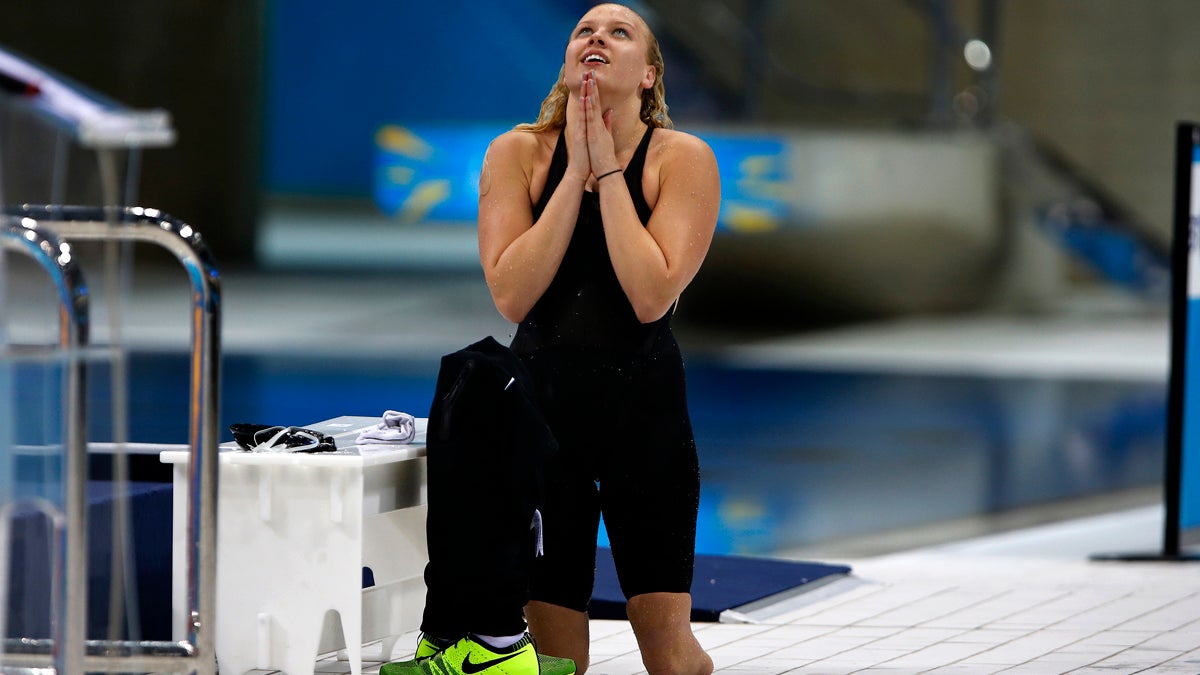The Paralympics have started, and nobody cares

Team USA's Jessica Long reacts after wining the Women's 100m Butterfly S8 category at the 2012 London Paralympic Games. (AP Photo/Emilio Morenatti)
I’m physically confined to a wheelchair, and I used to do track, field and table tennis. I had an offer to try out for the U.S. Paralympics team. So why have I been neglecting the Paralympics? Olympic apathy.
Morning light assaults my eyes as I try to eat breakfast on an average Wednesday. I’m in my family’s kitchen, with my sunglasses on, when I hear my mother sigh loudly from the next room.
She is desperately flipping through TV channels like it’s her job, and she asks me what channels the Paralympics are on. I tell her that I have no idea. This leads into a frank discussion.
My mom explains that I’m physically confined to a wheelchair, and I used to do track, field, and even table tennis — I even had an offer to try out for the U.S. Paralympics team — so why have I been neglecting the sports that I used to be a part of?
And why am I eating cereal with sunglasses on?
“You drank too much last night,” she points out as she enters the kitchen to get a glass of water.
She’s right. I did drink too much vodka at a party last night, but that’s doesn’t explain why I’m not watching the Paralympics. The reason is simple: Olympic apathy.
I’ve just finished a marathon of non-stop Olympic coverage. I’ve watched swimming events, track events, soccer, basketball, table tennis, and the slightly racist NBC commentary for two weeks straight. The reality is that watching these events all over again with athletes who happen to be physically disabled seems like an afterthought.
“Well, that’s a terrible thing to say,” says my mom, ever the moral compass, flipping through TV channels again.
I suppose it is terrible. However, no amount of guilt-inducing moral messages will shake the fact that I, along with most of the American public, do not care about the Paralympics.
NBC doesn’t care either. The network skipped the opening ceremonies and will only show four hour-long segments on cable network NBC Sports and a single 90-minute highlight reel on NBC. If the only U.S. network with broadcasting rights for the Paralympics doesn’t care about the competition, the American audience won’t either — except for good people like my mom.
I put the box of Frosted Flakes away, thinking about possible solutions to this problem. Maybe the Paralympics shouldn’t occur the same year as the Olympics. The viewing public could look forward to alternating Olympic/Paralympic competitions. It sounds great until I realize it would throw a wrench in the training schedules of all the athletes. Also, the Paralympics committee has to use the same facilities as their Olympic partners, because they wouldn’t be able to get a country to build stadiums and training facilities for them on their own.
What if broadcasters were forced to air equal coverage of both the Olympics and the Paralympics in order to win broadcasting rights? I smile to myself at this ingenious idea, but I soon turn to pessimism. What if the current arrangement is the best deal the Olympics committee could come up with to get NBC on board? What if the committee doesn’t care, when they are making billion-dollar deals behind closed doors?
Maybe the answer is a lot simpler. How about fixing the closing ceremonies of the Olympics? As of right now, the Olympic committee builds anticipation for the next Olympics by handing the torch over to the next host country (in this case, Brazil). Instead, they should have an Olympic athlete pass the torch to a Paralympic athlete to signify the start of the Paralympic Games.
One could see it as a shallow gesture, but it could set up the Paralympics as the next stage of the Olympics narrative, forcing audiences to demand more coverage for the Paralympics. The best way to keep your audience is to leave them wanting more.
NewsWorks contributor Scott Clifford is a senior film student with Osteogenesis Imperfecta at the University of the Arts (UArts). He lives in a spacious dormitory in center city Philadelphia when UArts is in session. For the rest of the year he lives with his family in central New Jersey.
WHYY is your source for fact-based, in-depth journalism and information. As a nonprofit organization, we rely on financial support from readers like you. Please give today.

